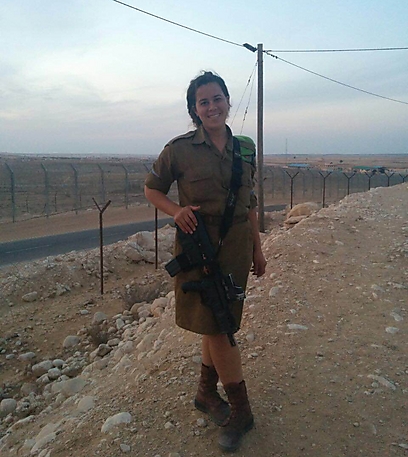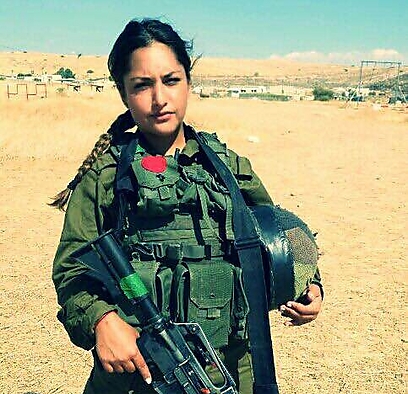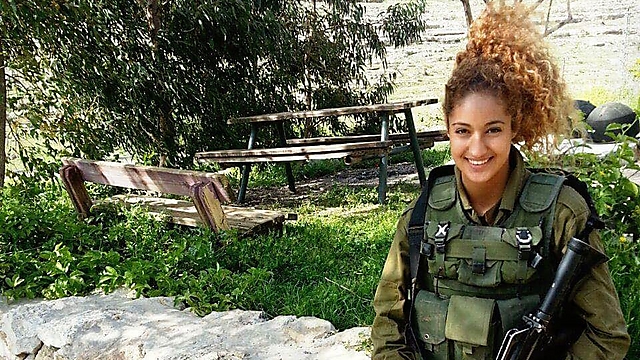Three young, motivated women explain why they decided to serve the State of Israel as combat soldiers instead of doing national service like other observant girls their age.
In 2010, 935 young religious women joined the IDF. In 2013, the number jumped to 1,616. Every year, the army receives more and more religious female recruits, who are not only enlisting for traditional roles in the Education Corps, but are also joining combat units.
This new trend should not be taken for granted, given the fact that one of the main statements issued by the Chief Rabbinate Council when Chief Rabbis David Lau and Yitzhak Yosef took office was that the Rabbinate “forbids IDF enlistment in any way, continuing the tradition of the previous chief rabbis.”
But it seems reality is stronger than halachic rulings. Meet Ornella, Sari and Hila, three religious female fighters who are convinced that despite the many difficulties, a religious girl who wishes to contribute to her people belongs in the army.
A fighting family
When 21-year-old Sari Michael of Netanya joined the Caracal Battalion in March 2013, she received surprised reactions from her close and distant surroundings. She studied at the Bar-Ilan religious girls’ school, where she says the educational staff conveyed a clear message that the best place for a young woman from the national-religious sector is national service.

“I come from a fighting family,” Michael says. “My grandfather was an instructor in the Navy’s Shayetet 13 special forces unit, I have an uncle in the Givati Brigade, another uncle who is a combat medic, another relative in Intelligence Unit 8200, and they each contribute as much as they can. I have a female cousin who joined the Caracal Battalion a year before me, and when we meet on Saturdays we share our experiences from the service.”
At her parents’ request, Michael began doing national service at the Defense Ministry, but realized after several months that her goal was significant combat service. So she left and joined the IDF, where she was sent to serve in the Air Force. “I said to them, ‘I want to be a combat soldier. I want experiences.'”
‘I became more religious in the army’
She got her share of experiences at the Caracal Battalion, which mainly deals with securing the Israel-Egypt border. About two-thirds of its soldiers are women.
Asked whether she experienced any crisis following the move from convenient national service to an exhausting basic combat training, Michael replies sincerely: “There isn’t a single combat soldier who doesn’t experience a crisis, but I received support from Captain Einat Cohen, who is responsible for the enlistment of religious girls in the army.
“She fought for my rights. She also gave me her personal cell phone number, and I know that even if I call her at 2am – she will pick up the phone.”
And what do you do when you have religion-related questions?
“There is the battalion rabbi, and I also consult my father. There are clear orders in the army. One of them deals with human dignity. It doesn’t matter if you’re religious or not, Jewish or Christian or Druze; you respect your fellow man and he will respect you. My friends are considerate. They don’t listen to loud music on Shabbat, but use headphones. In my unit there are many traditional people and five religious girls – which is a lot.”
As for her difficulties as an observant Jew, she says: “It’s clear that during action it’s more problematic and harder to implement, but I believe that any soldier who wants to be religious can be religious. It all depends on you, and I have actually become more religious in the army.”
This may sound strange to some soldiers, but Michael doesn’t have a hard time when she is forced to stay in the army on Shabbat. “My mother always told me that on Shabbat a person has an elation, and I enjoy Shabbat in the army. There is the Kiddush, there are prayers in the synagogue, we sit through the meals and laugh. We also have time for ourselves, and Shabbat is really good for the soul.”
‘Israel means more to me than anything’
Ornella, 21, immigrated from France a little over a year ago in order to join the IDF. Her father was born in Israel, her mother in France, and her family lives in 15th arrondissement of Paris. As there was no Jewish educational institution near her home, she studied in a public school with many Muslim students.

“I am familiar with anti-Semitism,” she says. “I was the only Jewish girl in school. I didn’t hide the fact the I was Jewish and walked around with a Star of David medallion. Many of the students didn’t like it, and they were always looking for a fight.”
Asked whether she hesitated before making aliyah and joining the IDF, she replies decisively in an enchanting French accent: “I have been very Zionist ever since I was a little girl. The State of Israel means more to me than anything.”
Ornella’s brother, who also immigrated to Israel, didn’t serve in the army, so her decision to sign up for combat service raised eyebrows in her family. “It scared them. They don’t know any girls in combat service. But now I’m about to end my military training, and they are proud of me and believe that religious girls can also serve in combat roles.”
3 religious soldiers out of 80
Ornella says God helped her with the basic training difficulties. “My faith helped. As they say, ‘Think positive and things will be positive.’ If I want to, I can.”
She joined the IDF in November 2014, and began her basic training in March in the Lions of Jordan, a new infantry battalion where men and women serve side by side.
Asked about her service alongside secular soldiers and how she deals with the issue of desecrating Shabbat for operational reasons, she replies: “My commanders always let me pray the morning and afternoon prayers, and let me leave the light on before I go to sleep so that I can read the Shema prayer. Although we are three religious soldiers out of 80 in the battalion, the boys know I am religious and respect me.
“The Shabbat problem is less problematic right now, because I am in advanced training and we haven’t reached the line yet. But the question of desecrating Shabbat began with securing communities, when we have to travel by car. Every time I had a question, I turned to the Paratroopers’ base rabbi and he answered me. I also consult my brother.”
‘You can’t please everyone’
Hila Lev Ari, 20, from Moshav Bareket, serves in the Home Front Command’s rescue battalion. These days, she and her fellow soldier have been stationed in one of the hottest areas in Samaria. She studied in the Sha’alvim religious girls’ high school and later in Yigal Alon High School.

She was motivated to join combat service following a terror attack in 2002, in which terrorists fired at hotels in Netanya, murdered two and injured many. She experienced the incident as a little girl, but says it changed her.
“My family wasn’t hurt, but these are the kinds of things that build you. I decided that if there was something I could do to prevent others from going through what I did, and turn the country into a safer and better place, I would devote myself to it.”
Lev Ari is an only child. “At first, my parents tried to convince me to do national service, but I realized that this is my life and that I can’t please everyone. My parents understood, and now they are proud of me.”
As reported by Ynetnews
